2023 Vázquez-Valarezo Poetry Award winners announced
Carly Davis's poem "Seattle Song" won the 24th annual Vázquez-Valarezo Poetry Award at Augustana.
Spotlight on students
New students, honorees, alumni
Ezekiel Aurelius: Teaching in the real world
Kira Banks wins CAMWS Diversity Award
Events and activities
Upcoming
Spring AIA Lecture: Dr. Susan Rotroff
Featured article: Remembering Dr. Harry S. B. Johnson
Acknowledgements
• WELCOME to our newest students! So far this year, we have added two new students as Classical Studies minors – Iratze Aceves and Charlotte Newport. Iratze is majoring in Public Health and French, and Charlotte is majoring in History. Welcome, carissimae!
• This year, we inducted four new students into our Epsilon Sigma chapter of Eta Sigma Phi, the National Honor Society for Classics: congratulations to junior Kira Banks, and sophomores Alexis (Allie) Anderson, Olivia (Via) Montgomery and Laurence Pavlik.
• Two students are also being honored with induction into Glaux Aquila, Augustana’s own honor society for those who dare to brave both Greek AND Latin. Congratulations to Allie Anderson and Laurence Pavlik!
• This May we will bid a fond farewell to three graduating seniors: Ezekiel Aurelius (Classics), Kellis Montgomery (Classics and biology), and Jameshia (Meshia) Walls (Classical studies with a Latin emphasis and pre-med).
In addition to their induction in 2020 into Eta Sigma Phi, the national honor society for Classics, all three are being recognized for additional achievements in Classics: Aurelius has received the award for Best Research by an ΗΣΦ Laureate for his Senior Inquiry Project “What’s Your Declension? Non-Binary Language for Ancient Latin,” while Montgomery and Walls are being honored with CAMWS Awards for Outstanding Accomplishment in Classical Studies. Εὖγε!
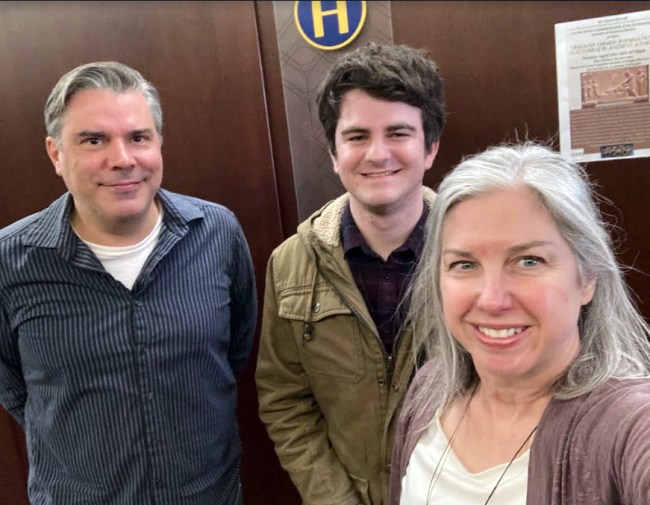
Dr. Mischa Hooker, Nathan Payne '17, and Dr. Kirsten Day
• Alumnus sighting! Drs. Hooker and Day were delighted by a surprise visit from Nathan Payne '17 (Classics and English). After teaching Latin at Marshall Academy in Marshall, Mich., for four years, Nathan moved in January of this year to St. Philip Catholic High School in Battle Creek, Mich., where he is teaching English; next year, he will add Latin to his teaching duties. Thanks for stopping in, Nathan!
If any other alumni are in the area in future, we encourage you to stop in as well! And please do send your own updates to Kirsten Day to be included in the next newsletter!
Ezekiel Aurelius offers a Latin grammar lesson to his middle school students at Rivermont Collegiate (Photo credit: Rebecca Rice)
Senior Ezekiel Aurelius is aiming for a career in Latin teaching: to this end, he applied for a number of graduate programs in Latin teaching for the next school year and registered for a teaching internship experience this spring term as a part of Dr. Kirsten Day’s second term beginning Latin course. And while he’s still a full-time student with a busy extra-curricular schedule to boot, when he heard that a middle school Latin class at Rivermont Collegiate had a mid-year opening, Ezekiel jumped on the opportunity. Here, he shares a bit about his experience:
The Rivermont experience
"When I first met the class of six students I asked them if they would be interested in learning real Latin. I was happy when they said yes! Though, with only two weeks before I started teaching there wasn’t a lot of time to come up with lesson plans. I went with the Oxford Latin Course as it has simple readings and a slow introduction to Latin’s declensions and case endings. However, moving forward I want to change this Intro to Latin class to focus on more living Latin as I think it will be more exciting for the students and will encourage them to want to learn more vocabulary and write more.
"Next year is when I intend to implement these new lesson plans. While I continue to teach at Rivermont Collegiate, I will be attending my graduate studies at University of Kentucky’s Online Latin Graduate Certification program. I also hope to expand into teaching Latin at the high school level as well as other topics such as Roman/Greek history, philosophy, and mythology."
— Ezekiel Aurelius
Congratulations to Kira Banks, who won the Classical Association of the Middle West and South’s Rudolph Masciantonio Diversity Award for 2022! Along with a monetary award, Kira was recognized at the 2022 CAMWS convention at Wake Forest University in Winston Salem N.C.
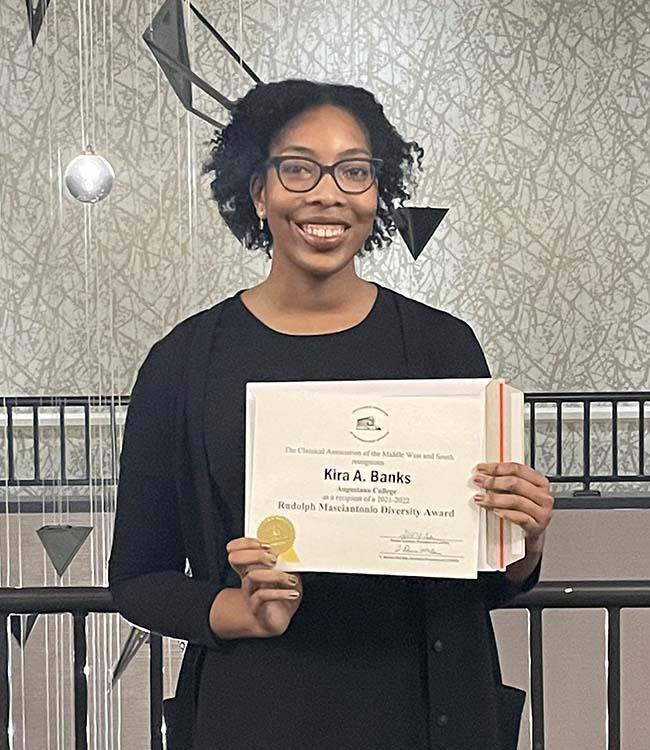
Kira Banks receives the Rudolf Masciantonia CAMWS Diversity Award at the 2022 CAMWS convention in Winston-Salem, N.C.
Kira is a triple major in Classics, biology, and public health. After she graduates in the spring of 2023, Kira plans to go on to graduate school in public health and then pursue a career addressing the inequities that exist in our health care system.
But Kira is already enacting real change in her community now, and she has been doing so from a young age: she assisted with the creation of a white paper addressing racial health disparities with Cook County Commissioner Donna Miller for presentation at the National Black Caucus of Legislators.
She helped draft legislation to advocate for youth in the COVID-19 pandemic; advanced educational initiatives as a Youth Ambassador at Lurie Children’s Hospital; advocated for teen mental, physical, and sexual health as a Mikva Challenge Teen Health Council member; and promoted education on issues of sexism, feminism, and gender identity as a member of the Mikva Challenge Women’s Leadership Council.
On campus, she is active in the Black Student Union and Ladies of Vital Essence (LOVE), an organization of diverse women; she is a mentor in the PACE (Preparedness, Awareness, Community, and Engagement) Multicultural Mentorship Program; and she even helped to create a campus Step group, for which she serves as secretary.
While her long-term goals are not Classics-focused, Kira is very clear-eyed in her understanding of how Classics contributes to her career interests. When I asked her how she saw Classics fitting in to her long term goals of entering the public health field in order to address health inequities, such as racial and socio-economic disparities in health care access and treatment, she spoke eloquently about the ways that studying Classics makes her think differently than she does in her STEM classes, which often have more straightforward approaches, whereas Classics helps her to think critically and in more complex ways. She expressed appreciation that Classics has allowed her to explore the practices of ancient cultures and make connections to contemporary society, which she believes will be useful in her attempts to close health gaps between communities.
With her tripartite approach — with majors in humanities, sciences, and social sciences — Kira is taking advantage of all a liberal arts education has to offer. Her example demonstrates why an education in Classics continues to be important and how it can help to make a real difference in the world in ways that seem surprising or unrelated to those outside our field. We have no doubt that she will take her education in Classics and use it to make the world a better place, and perhaps help to shine a light on the value of a classical education in the broader public eye.
Congratulations, Kira! We are proud of you!
Collegia Classica: Rebooted
A report from Treasurer Ezekiel Aurelius
This year, Collegia Classica was led by Co-Consuls Kellis Montgomery and Meshia Walls, Secretary Henry Webb, and Treasurer Ezekiel Aurelius.
Our biggest success this year was the correction of an administrative error that had been preventing the club from receiving SGA funding in previous years. We also received generous funds from the CAMWS Caristia Grant and Humanities Fund Grant. The funds were used to renew ties with our Augustana community and plan a large on-campus event.
With the help of these funding sources, our club has been more active than ever. We held weekly meetings where we would play games, learn about different areas of antiquity, or do crafts such as pottery. This allowed people to dip their toes into Classics. Outside of those meetings we would host movie nights and go to dinner together. We hope to have a few more movie nights and activities that are collaborations with other clubs and organizations on campus.
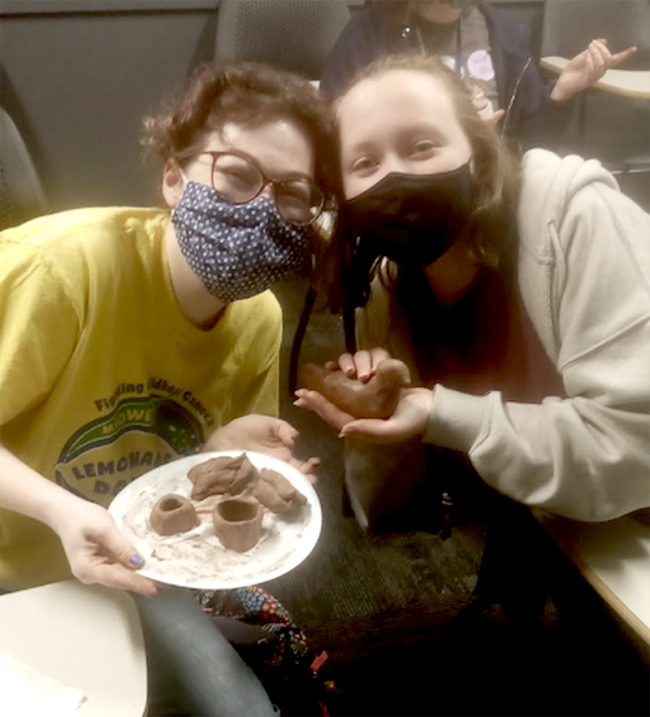
Sophomore Allie Anderson and first-year Paige Meyer enjoy pottery making with Collegia Classica.
We are also planning a large on-campus event titled the Language Olympics to be held April 30 from 1-3 p.m. April 30 in Gavle 3 in the Gerber Center. The event will consist of a culture fair with the other language departments at Augustana and a sporting event between those in the language departments. The event will be open for all of campus to attend and we even have invited special guests from Knox and Monmouth College Classics clubs! Come join us if you are in the area!
Despite some continuing challenges with the pandemic, we have managed to maintain our vibrant lecture program this year.
• Last October, we welcomed Dr. Jinyu Liu of DePauw University as our Antiquity in the New Millennium Lecture Series speaker. Dr. Liu spoke to a virtual audience on “Cross-Cultural Translation of Exile Literature: How would Ovid Lament in Mandarin?” She later graciously provided an interview to the Augustana Observer’s Etta Brooks over her research on this topic.
• Our Archaeological Institute of America lecture this year will be provided virtually by Dr. Susan Rotroff, professor emerita from Princeton University at 7:30 p.m. on April 26. Dr. Rotroff’s talk is entitled “Dreams, Drugs, Fumigations: Doctoring in Ancient Athens.” If you would like to join, the link is noted on the Augustana Events page, or email kirstenday@augustana.edu, and we’ll send you a calendar invitation.
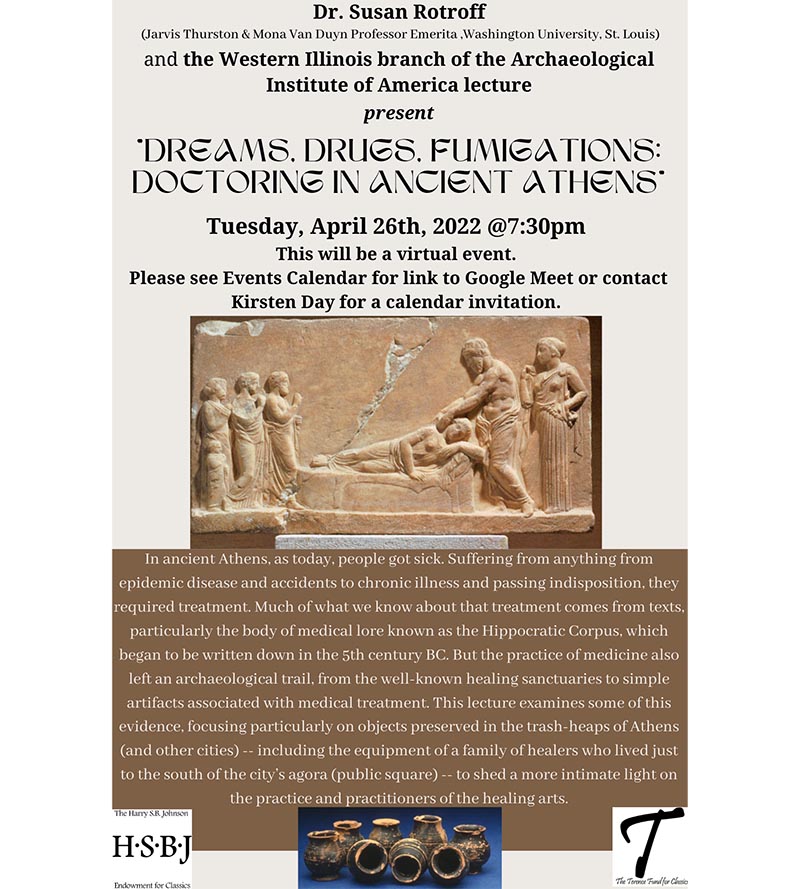
• And this year, we were thrilled to be able to offer a second bonus lecture in addition to the one given by Dr. Robert Morley as reported on in our fall newsletter. In February, Dr. Rachel Horner Brackett, visiting assistant professor in sociology and anthropology, spoke on “Etruscans at the Crossroads: The Lost Cities of Tuscany,” drawing on her experiences studying Etruscan archaeology through an NEH summer fellowship. If you’d like to know more, see Krystina Slack’s interview with Horner Brackett that appeared in the Augie Observer.
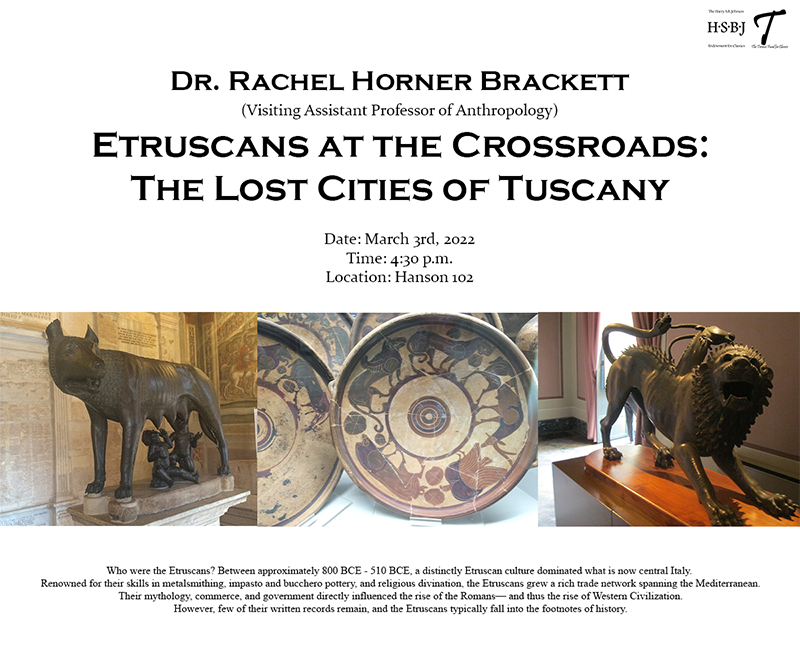
Dr. Rachel Horner Brackett promotional flyer
After a two-year hiatus due to COVID, one of our most cherished traditions returns this spring! From 6-8 p.m. April 19, we will gather in the Gävle rooms in the Gerber Center to laud our honorees, recognize graduating seniors, and welcome our new majors and minors.
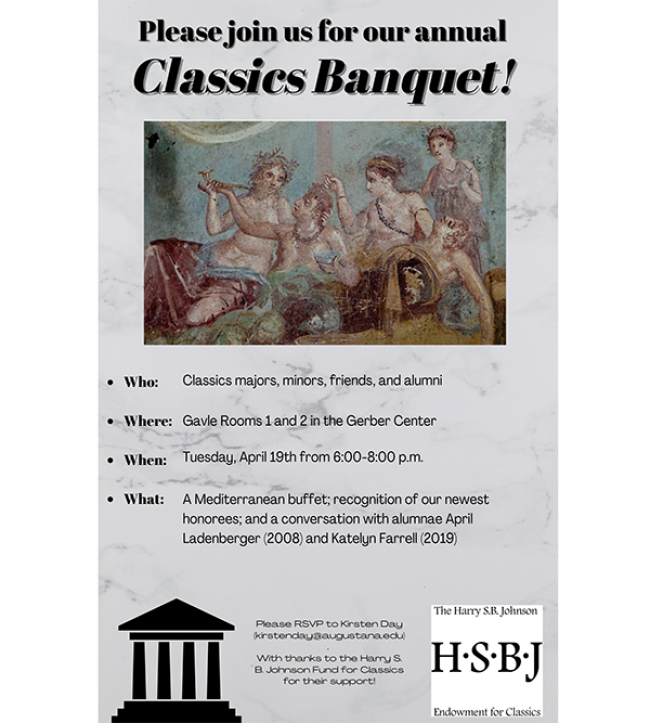
This event also will feature our traditional Mediterranean buffet and a talk by Classics alumnae April Ladenberger ’08 and Katelyn Farrell ’19 on how Classics has benefitted them in their lives beyond the classroom. Tyler Vens ‘09 also will make an appearance! As always, we welcome current and prospective majors and minors, as well as former faculty, supporters, and any other alumni who will be in the area.
We issue a special invitation to our 2020 and 2021 graduates, who were not able to enjoy this event in their last year or two at Augie. If you are interested in coming, please email your RSVP ASAP to Dr. Kirsten Day.
If you have read previous newsletters, attended Classics events on campus, or taken a good look at the posters advertising Classics-sponsored activities, you are probably familiar with the name Harry S. B. Johnson in association with the Harry S. B. Johnson Endowment for Classics. In this edition of the newsletter, we’d like to shine a light on the man in whose memory the Harry S.B. Johnson Endowment was created.
According to his son David, Harry S. B. Johnson’s interest in Classics began in 1930 when he enrolled at Augustana as a pre-seminary student and came under the influence of Dr. I.M. Anderson, who was professor of Greek at Augustana from 1904-1944. In a 1940 letter, Johnson emphasized the formative role Anderson played in his life:
“No one can measure the influence which the consecrated teaching of Dr. I. M. Anderson had upon my life, for he took it when it was without confidence and filled it with determination, he took it when it was beset with forces stressing the outward appearances of strength and pointed the way to up-building of the inner man.”
Anderson sparked a life-long love for Classics in Johnson, and after graduating summa cum laude from Augustana College and the associated Augustana Theological Seminary, Anderson had him teach a beginning class as a part-time instructor. In 1942, he became full-time assistant professor of Greek.
As Professor Anderson neared retirement, Johnson felt the need for further study of Greek, as his language experience was limited to what he’d gotten in his four years as an undergraduate and his four years of study in the seminary, so Johnson and his young family spent a couple of summers living with family in Chicago while he attended graduate classes at the University of Chicago.
In thinking back on those days, Dr. David Johnson recalls, “I remember that one of those summers there was a truck driver strike which curtailed the delivery of gasoline to most of the gas stations in Chicago. There was one, however, that was located right next to a railroad siding that had gas. The lineup of cars for a fill up was extensive. As a youngster I went with my dad to get a fill up. My job was to stand outside on the margin and signal to him when the line was moving. He was studying Greek at the wheel.”
In 1945, Johnson was appointed dean of men, a position he held until 1964. During this time, Johnson was fondly referred to as “Dean Harry,” as he is on the webpage that highlights the Johnson Endowment. Dr. David Johnson explains: “When he became Dean of Men back in the mid 1940's, the Dean of Women1 was Olive Johnson. So it was Dean Olive and Dean Harry. Olive left shortly thereafter, but the Dean Harry stuck. For the size of the institution at that time it was probably a good mix between the formal and informal.”
Bookcase constructed (in four parts for ease of transport) for I.M. Anderson by his father in 1894 before I.M. came to Augustana. After Professor Anderson retired, the bookcase stayed in H. S. B. Johnson’s office as long as he remained Dean of Men, and later, with the college's approval, he brought it to his home. It now resides in the home of Drs. David and Anne Johnson, where it showcases a few of H.S.B. Johnson’s Classics books, along with family mementos from Johnson’s roots in Sweden.
Because experience in Greek was a requirement for the Augustana Theological Seminary, there was a “market” for Greek, and so even after becoming dean, Johnson continued to teach the first two years of Greek and tutor the occasional major, some of whom went on to advanced studies.
And as noted on his “Notable Faculty” page, along with his other duties, Johnson was coordinator of public events, in charge of student employment, and coached tennis, the latter of which Johnson’s son Dr. David Johnson commented on with amusement: “The previous Dean of Men was also the tennis coach so it came with the job. To begin with he did not know much about tennis and used to say that what he did was to throw out the balls. He did drive the team to away meets. How he had the time to do that I will never know.”
Johnson received an honorary Doctor of Divinity degree from the Augustana Theological Seminary around 1960, and in 1964 after almost 20 years in the position, Johnson resigned as dean of men and became head of the Greek Department.
By that time, the seminary had left for Chicago and the close connection between it and the college slowly faded away. David Johnson, who by this time had graduated from Augustana himself, says that his father remained convinced of the value of the Classics – “he would always advise students to take a semester of Plato rather than the course on New Testament Greek” – and he began to think of ways he could revitalize his approach.
As he was past the point where he could return to any sort of study towards an advanced degree, Dr. Johnson took a year-long sabbatical, first connecting with his roots in Scandinavia, and then traveling to Greece. The younger Dr. Johnson recalls: “Seeing all the ancient sites for the first time was thrilling. He and mom had introductions to visit the homes of families of Greek immigrants living in the Quad Cities. He was fortunate enough to have several visits with Oscar Broneer, a well-known archaeologist who was also an Augustana grad. The year did reinforce his belief in the importance of his work at Augustana in both Greek and Swedish, particularly in the importance of the Classics.”
During most of Dr. Johnson’s time at Augustana, both as a student and as a faculty member and dean, Latin had been taught by Margaret Olmsted, who also taught math, and who was one of the earliest female professors at the college. After her retirement in 1967, however, Latin was only taught irregularly, usually by a visiting instructor.
As he neared retirement, Dr. Johnson hoped that the college would hire someone to carry on teaching Greek and even build up an expanded Classics program, and so he shifted his teaching load to Swedish, which he had learned growing up. In 1974, the college was awarded a three-year Mellon grant for faculty development. While there were many suggestions from faculty and admissions administrators about which faculty should be developed, the idea that prevailed came from Harry S. B. Johnson and philosophy Professor Harold Sjursen and was endorsed by then Dean Thomas Tredway with the support of the English and Religion departments: Johnson and Sjursen argued that by the end of the three-year grant, which coincided with Johnson’s planned retirement, a Classics program could have the enrollments to be self-sustaining.
After a search, the college hired Dr. Thomas Banks, who had earned his Ph.D in Classics from University of Minnesota the previous year. Dr. Banks, who credits Johnson with recognizing that Classics itself is by nature an interdisciplinary program, helped to establish the more traditional Classics department, which, in Johnson’s view, was essential to preserving the study of Classics at Augustana.
Just before his death in 1976, Harry S. B. Johnson was made a Knight of the Royal Order of the North Star First Class by H. M. Karl XVI Gustav, King of Sweden. In his memory, Dr. Johnson’s family established the Harry S. B. Johnson Endowment to support innovation and enrichment in the Augustana Classics program.
It is largely due to the support of this fund that our department continues to be able to enhance our curriculum with Archaeological Institute of America and Antiquity in the New Millennium lectures; our annual Classics banquet; institutional memberships in the Classical Association of the Middle West and South and the American School of Classical Studies at Athens; student memberships in Eta Sigma Phi and both student and contingent faculty memberships in the AIA; end-of-term dinners for majors and minors; trips to conferences and other Classics-related events; and much, much more.
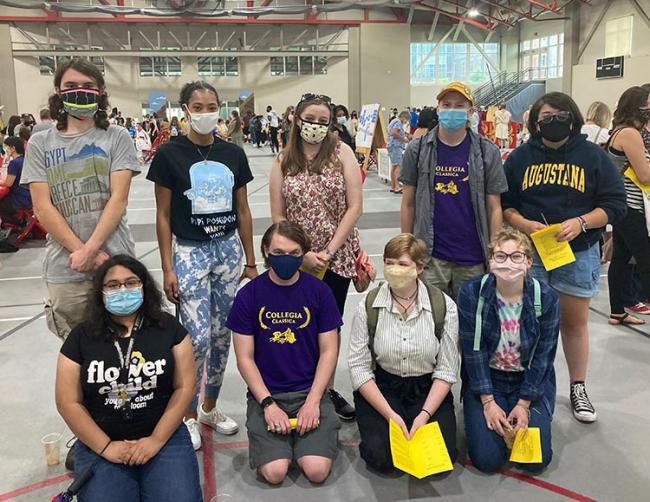
Collegia Classica members at the fall 2021 Classics Day event at Monmouth College – one of the many activities that the Harry S. B. Johnson Endowment helps make possible. (Pictured: Laurence Pavlik, Meshia Walls, Kellis Montgomery, Ezekiel Aurelius, and Elena Haffner (back row); Jessica Zabala, Henry Webb, Via Montgomery, and Allie Anderson (front row).
So next time you hear the name Harry S. B. Johnson, or hear the endowment established in his memory acknowledged, we hope you’ll take a moment to remember the man who helped make Classics at Augustana what it is today.
*Information in this article has largely been provided by Harry S. B. Johnson’s son, Dr. David Johnson. We are grateful to the younger Dr. Johnson for his contributions, and to Dr. Tom Banks for providing additional details.
1 The positions of Dean of Men and Dean of Women were combined at a later date into Dean of Students under James Ribbeck (the Dean of Women at the time had been Betsey Brodahl, for whom the Brodahl Center was named).
As always, we would like to acknowledge friends of the Classics department for their continuing support. Major funding comes from the Harry S.B. Johnson Endowment for Classics, established by family and friends in honor of Harry S.B. Johnson, who was Dean of Men and Professor of Greek at Augustana from 1942-1964, and from the Terence Fund for Classics, established by former Augustana professor of Classics Jane Borelli. Gift funds like these help support events and initiatives highlighted in this newsletter, and much, much more. Multas gratias vobis agimus!
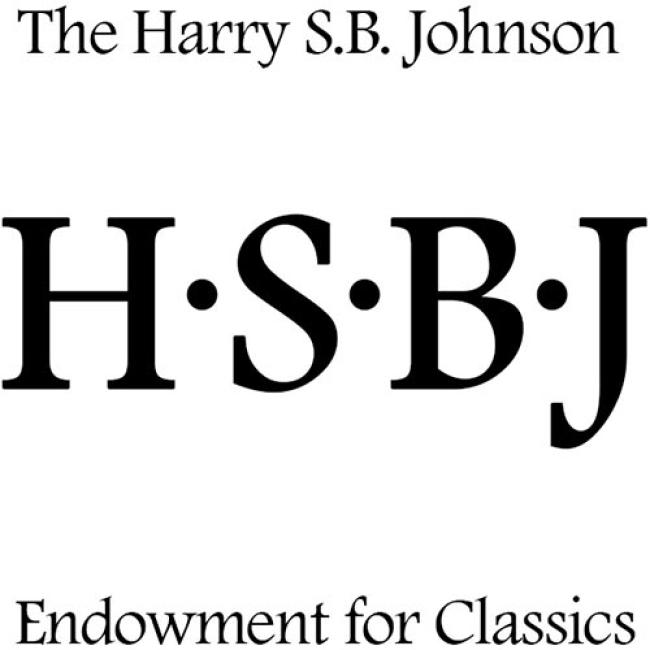
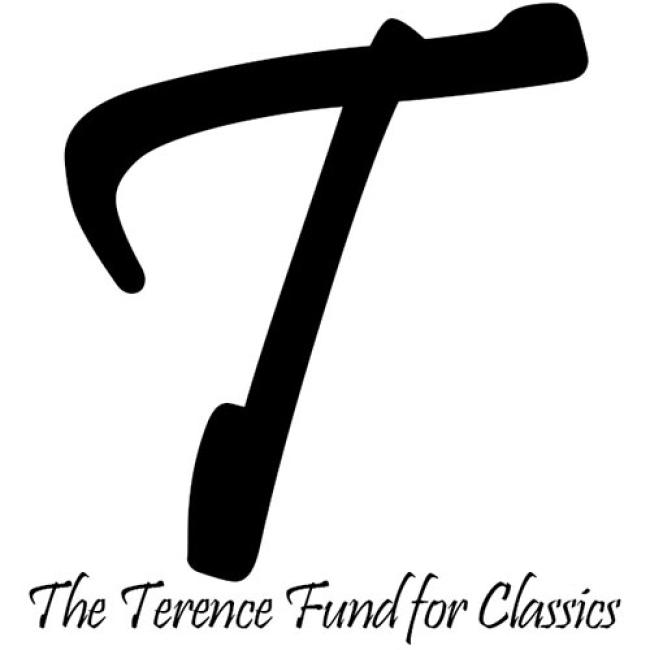
Carly Davis's poem "Seattle Song" won the 24th annual Vázquez-Valarezo Poetry Award at Augustana.
Kaitlin Jacobson's poem "crooked smile"” won the 23rd annual Vázquez-Valarezo Poetry Award at Augustana.
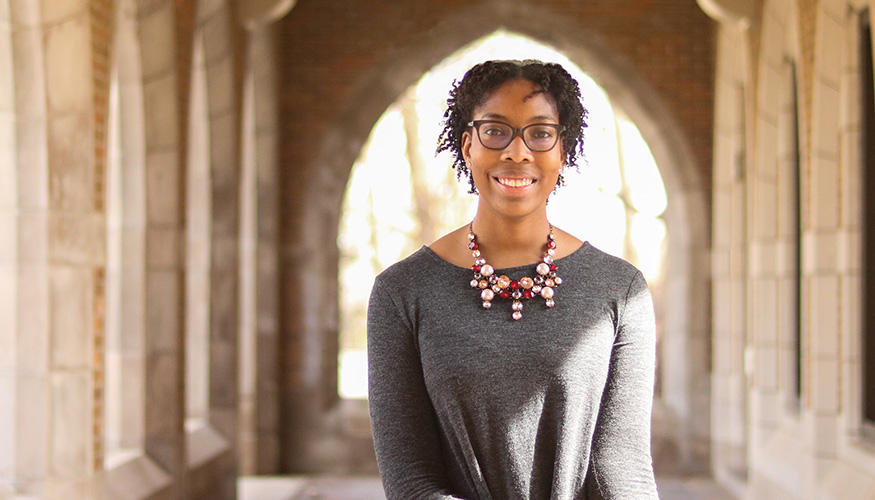
Kira Banks '23 came to Augustana to study biology and public health and, as often happens at a liberal arts school, discovered a passion for a seemingly unrelated major — Classics. Read about her recent award.
Dr. Robert Holschuh Simmons, Associate Professor and Chair of Classics at Monmouth College, will present a lecture entitled "Demagogues and Masses in Athens and the Athenian Theatre: Class Anxiety and Apprehensions About Insurgencies in Euripides’ Tragedies."